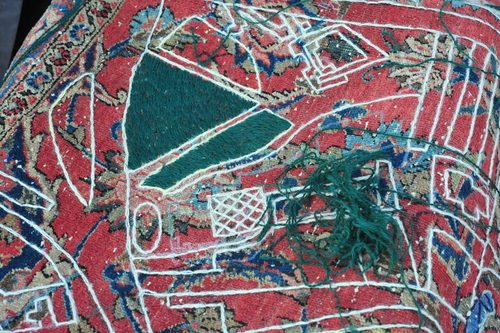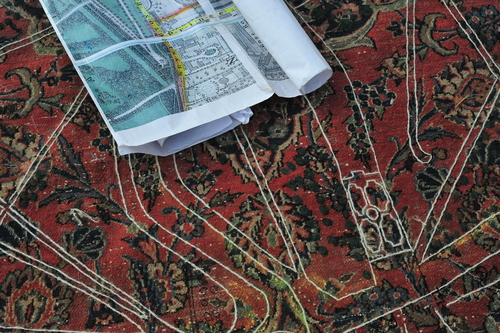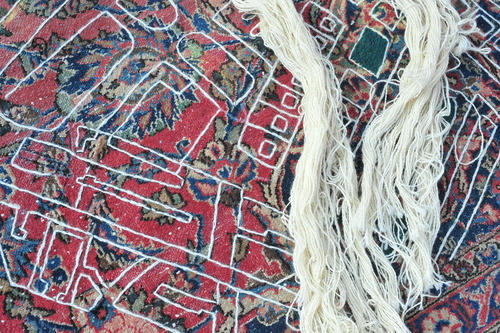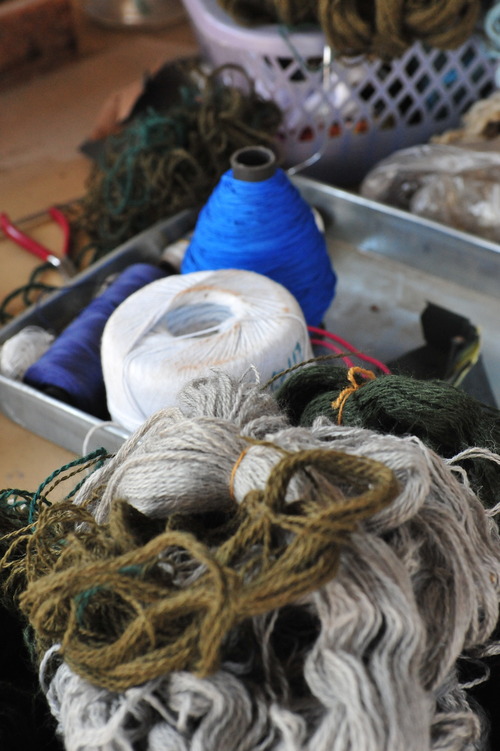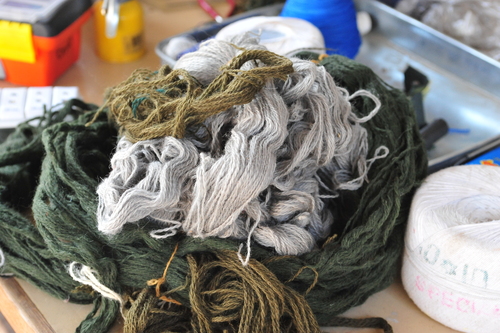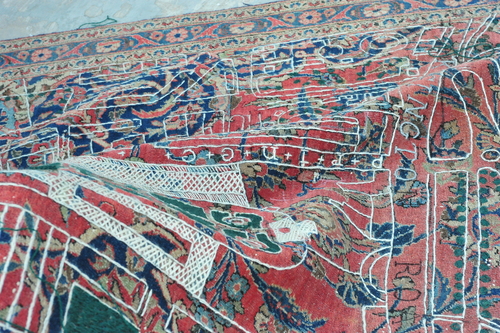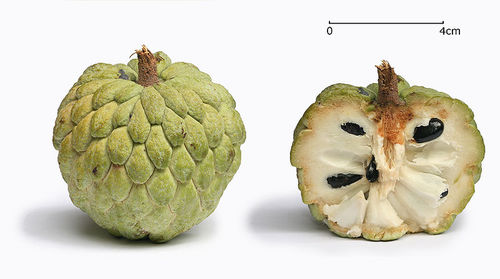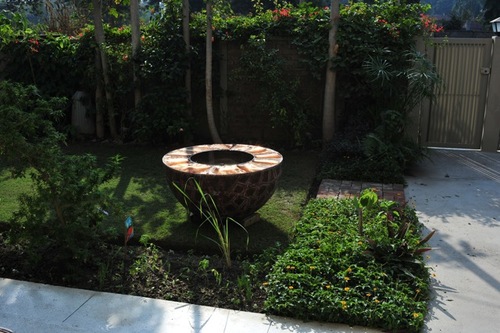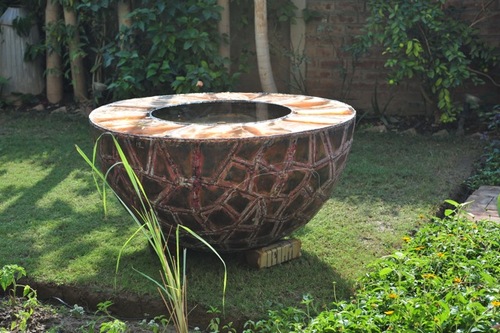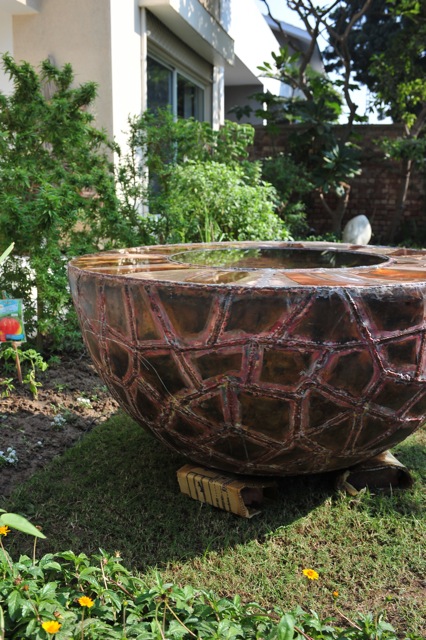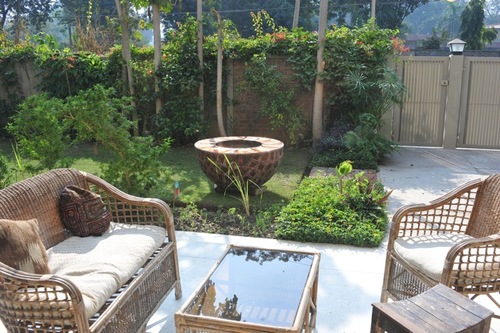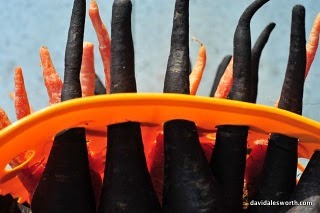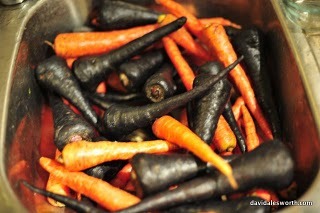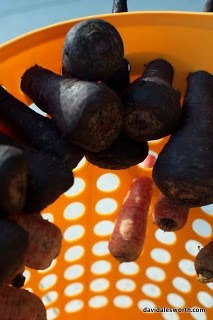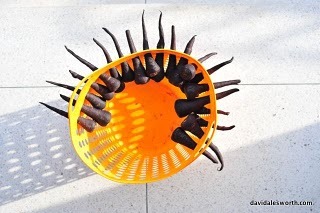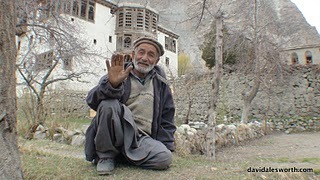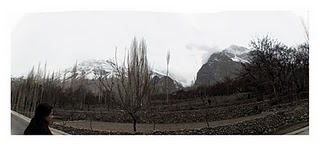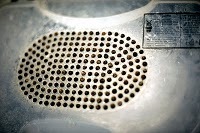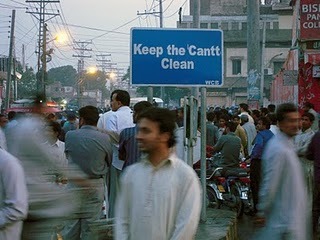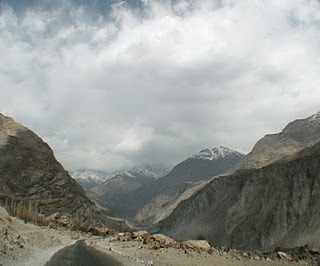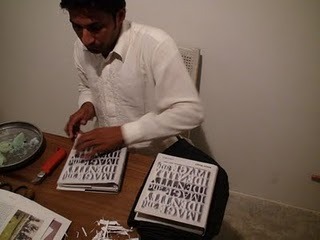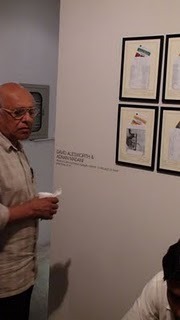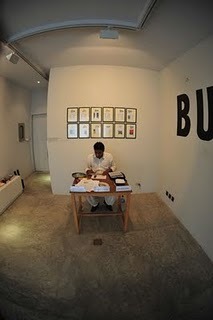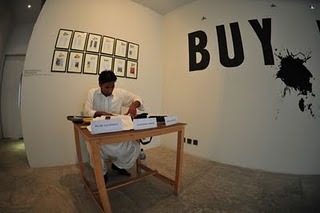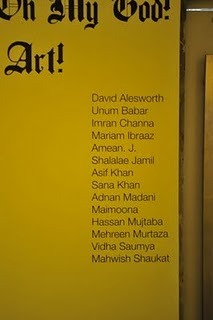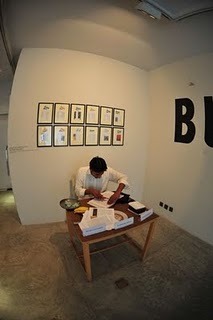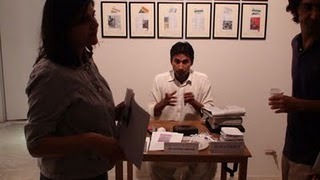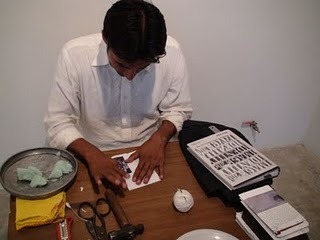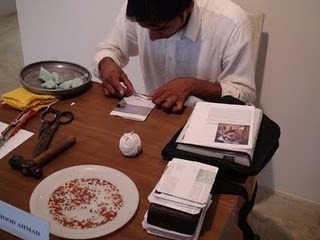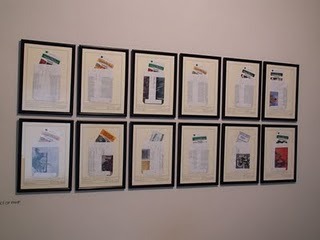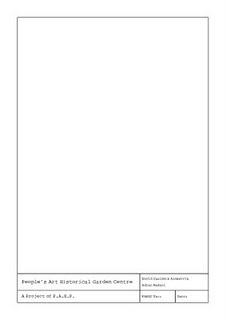http://www.vam.ac.uk/content/exhibitions/exhibition-jameel-prize/jameel-prize-4/#David%20Alesworth
Flower Pots

– newly stacked old flower pots at the back of the house.
In the course of moving things around yesterday a pair of large Kraits were spotted around the compost bins. I have my doubts as none were found later and everything was moved about. Kraits have a reputation for seeking shelter indoors in the rains. Their bite gives rise to 100% Mortality, when left untreated. They bite and hold on, tiny fangs pumping a surprising amount of venom for a smaller snake. Their neurotoxin causes no immediate discomfort and is often dismissed until full paralysis sets in. They have been known to bite people in their sleep, who then never wake up.
More Bins, More Compost
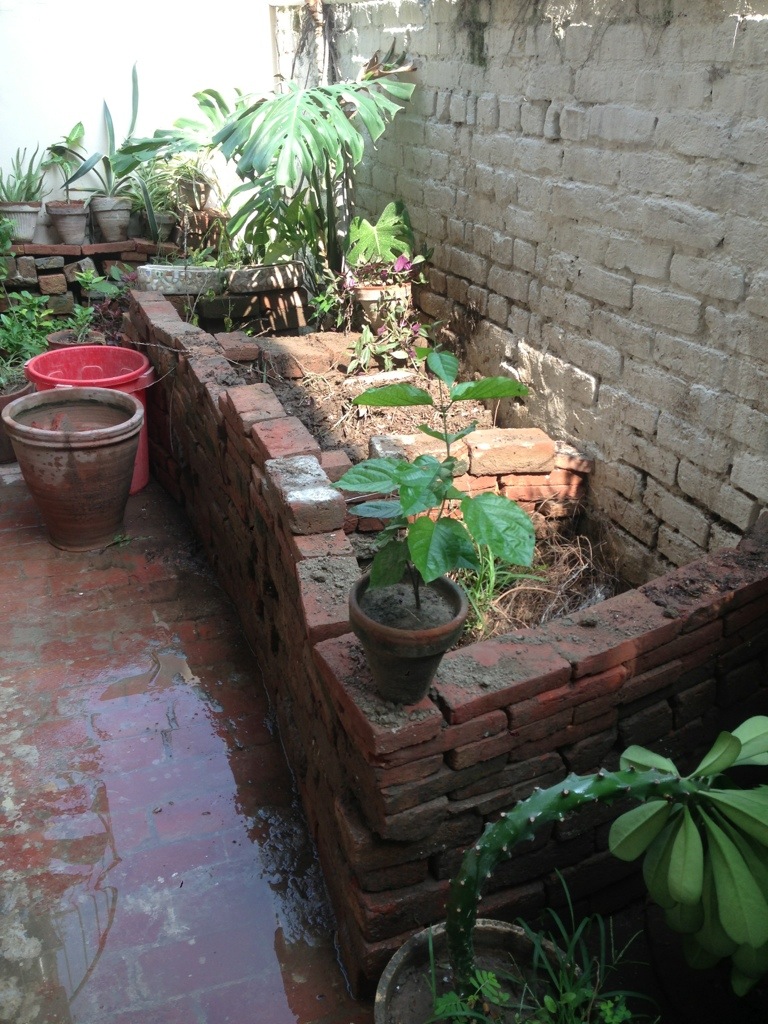
– a small potted Clerdendron splendens climber sits atop the compost bins.
We moved all the spare pots during monsoon rains yesterday and made space for yet another compost bin.
Compost is the absolute essence of my garden, not that I produce any where near enough of it. I can see and feel it transforming the ground into something magical, spiritual even and definitely alchemical. This is the dark and friable philosophers stone. It’s nutrients visibly flow up into the plants and it’s other complexities meld with the plants feeding roots in symbiosis. Making and using compost has become one of my greatest gardening pleasures. What can beat the satisfaction of a full and healthy compost heap?
Studio update, Ist February 2011
Hyde Park, London, circa 1850’s
– from a found map fragment.
New rug works, details
Dyed wool yarns
embroidery in progress.
Garden Works
A Water feature, one of a pair in progress for a new garden,
based on the Sharifa fruit or Custard Apple, Annona squamosa.
Thick welded copper sheet throughout.
42″ wide.
Febuary-March, Cantt. Lahore, Ganche, Baltistan
| Carrots in the washing basket, 13 March 2010
I’ve been thinking about inserting carrots into this plastic washing basket since i got it about two years ago.It seems made for them. Though I hadn’t counted on its flexibility nor their weight. Then there’s the lack of symmetry in an average Pakistani carrot. These black carrots are amazing, they seem another whole species from their bland orange cousins. The bigger picture is a putting together of the product of industry and the produce of nature. Both are interventions of a sort, neither are “natural”. This goes beyond my anthology of plastics.
|
| Black and red carrots, 13 March 2010 |
| Black Carrot juice, 26th March 2010, Lahore
Carrots in the clothes basket, 13th March 2010 Mixed carrots and plastic Black carrots and orange plastic, 13th March 2010 The shoot set-up with Nikon D3 Dyed eggs for Naurose,
|
| Khaplu village from above, 23rd March 2010 |
| Khaplu high plateau in search of lawn-grass, 23rd March 2010 |
| Panorama with Huna, Khaplu 23rd March 2010 |
| Black Peppercorn Haier top-loader, detergent free twin tub, 14th March 2010 |
| Body parts, mobile phone advert, R.A. bazaar Bombings, Friday 12th March 2010 |
| Washing down R.A. Bazaar, bombings, 12th March 2010 |
| R.A. Bazaar bombings, 12th March 2010 |
| Just outside Skardu by road, 23rd March 2010 |
| Cabbage White’s eating all my Ruccola, 26th March 2010 |
Modes of Enquiry
Currently I am involved with:
Walking Lahore as psychogeographical derivé. Starting at the Ganda Nala on Zafar Ali Road, Gulberg. Working with Lawrence Gardens, Bagh-e-Jinnah.Had an initial walk through the park on an exceptionally drab smoggy day. Met with head mali Alam and his staff and borrowed plans of the park and other parks of Lahore. The People’s Art and Historical Project.
A collaboration with Adnan Madani, Karachi/London.
We are working on several new versions of the People’s Art Historical Garden Centre Project, that was performed to good effect at the opening of Greynoise’s recent showing on 25th October 2009, entitled “Patrons of Oh My God, I can afford Art”. Beginning work on my dissertation “The Post-Colonial Garden as a Palimpsest”.
Busy reading. Recently finished K. Helphand’s “Defiant Gardens”, much else to write up here. <meta name=”Title” content=””> <meta name=”Keywords” content=””> <meta equiv=”Content-Type” content=”text/html; charset=utf-8″> <meta name=”ProgId” content=”Word.Document”> <meta name=”Generator” content=”Microsoft Word 2008″> <meta name=”Originator” content=”Microsoft Word 2008″> <link rel=”File-List” href=”file://localhost/Users/davidalesworth/Library/Caches/TemporaryItems/msoclip/0clip_filelist.xml”> <link rel=”Edit-Time-Data” href=”file://localhost/Users/davidalesworth/Library/Caches/TemporaryItems/msoclip/0clip_editdata.mso”> <style> </style>
MANUFACTURER OF ” ” ROAD BLOCKER ” ” in KARACHI LAHORE ISLAMABAD PAKISTAN , WE ALSO MADE TURNSTILE GATES & REMOTE CONTROLL GATES IN PAKISTAN -NOW WE CAN STOP A BOMBER TRUCK WHO IS TRYING ENTERING & BLOW THE WHOLE BUILDING FROM HIS TRUCK .
100 % MADE IN PAKISTAN , IMPORTED SYSTEMS ARE EXPENSIVE WE ARE DIRECT MANUFACTURER IN PAKISTAN , INSTALLATION , AFTER SALES & SERVICES IS EASY FOR ALL OVER PAKISTAN CUSTOMERS -EASY SMOOTH OPERATION OF OUR OWN MADE SYSTEM IS AVAILABLE AT HALF PRICE THEN IMPORTED SYSTEMS -WE ARE DIRECT MANUFACTURER OF FORCED FULLY HARD STOP” ” ROAD BLOCKER ” “WE ALSO MADE – TURNSTILE GATES & REMOTE CONTROLL GATES , IN PAKISTAN – SEE OUR OTHER ADDS HERE –
<o:p> </o:p>
NOW WE CAN STOP A BOMBER TRUCK WHO IS TRYING TO ENTERING & BLOW THE WHOLE BUILDING – WE CAN STOP THAT BASTARD –
OUR EQUIPMENT IS REALLY A LIFE SAVING EQUIPMENT -SAVE ASSETTS =SAVE PEOPLES LIVES -SAVE EGO -2 TYPES WE MANUFACTURED -A) MANUAL CONTROLLED -B) HYDRAULIC CONTROLLED -JUST 1 SECURITY GUARD IS ENOUGH TO CONTROLL THIS GATE -ONLY IMPORTANT BUILDING CHIEF SECURITY OFFICERS LETTER HEAD ENQUIRIES WILL BE ENTERTAINED -WE ARE THE ONLY 1 MANUFACTURER IN PAKISTAN & WE USE BEST SYSTEM TO EJECT & RELEASE THE SYSTEM –
|
|
||
Studio check-in 1st Nov. 2009.
<meta name=”Title” content=””> <meta name=”Keywords” content=””> <meta equiv=”Content-Type” content=”text/html; charset=utf-8″> <meta name=”ProgId” content=”Word.Document”> <meta name=”Generator” content=”Microsoft Word 2008″> <meta name=”Originator” content=”Microsoft Word 2008″> <link rel=”File-List” href=”file://localhost/Users/davidalesworth/Library/Caches/TemporaryItems/msoclip/0clip_filelist.xml”> <style> </style>
Some current thoughts and initiatives.<o:p></o:p>
<o:p> </o:p>
<o:p>
</o:p>
Walking the ganda-nala’s of Lahore<o:p></o:p>
I have approached a potential collaborator for this venture and we are in the process of discussing it. The open storm drains in this massive city of 7+ million (1998 census figures) provide the only channeling of sewage from homes to its ultimate discharge in the now dead river Ravi. There are no treatments plants. However the ganda-nala’s also create ecological corridors through the city where plant and animal life is left fairly undisturbed. The current heightened tension in the city is making any walking venture deeply problematic, let alone undertaking a walk through a highly suspicious no-mans land. I hope to undertake an initial walk (and documentation) within a few weeks. <o:p></o:p>
<o:p> </o:p>
<o:p>
</o:p>
The People’s Art Historical Garden Centre Project<o:p></o:p>
Completed 25th October 2009 in collaboration with Adnan Madani. We have collaborated on several projects previously, notably “The Frankfurt School” video which is also covered in previous blog entries. See the newly added page of documentation and narrated video. Akbar Naqvi’s book “Image and Identity” (Oxford, 1997) is systematically dismantled and converted into useful paper bags. It is unbound and liberated from it’s burden of assumed authority. A reclamation, a reinterpretation and dissemination. Even an insemination (seeds are added to each art-historical bag). Like seeds themselves it is finally disseminated to the public of Lahore. <o:p></o:p>
<o:p> </o:p>
<o:p>
</o:p>
Eden project<o:p></o:p>
I have yet to locate specialist input for this project and I now see it as being a much longer term initiative. I hope at least part of it may be realized by next summer’s residency.<o:p></o:p>
<o:p> </o:p>
<o:p>
</o:p>
Berlin Collaboration 2009-2010<o:p></o:p>
I have sent out initial emails towards this collaboration. It is intended that a dual project be negotiated that comes to fusion and fruition in Berlin next summer. Something that involves horticultural practices in the cities of Lahore and Berlin.<o:p></o:p>
<o:p> </o:p>
<o:p>
</o:p>
Readings, recent and in progress, 1st Nov. 2009<o:p></o:p>
Tim Richardson. Vista, The Culture and Politics of Gardens.<o:p></o:p>
K. Helphand. Defiant Gardens.<o:p></o:p>
Khan. The Gardener.<o:p></o:p>
Ian Sinclair. Hackney that Rose-Red Empire.<o:p></o:p>
Reza Aslan. How to Win a Cosmic War.<o:p></o:p>
Charles Darwin. The Formation of Vegetable Mould.<o:p></o:p>
Foucault. Several Readers and The Order of Things.<o:p></o:p>
Isenberg. The Nature of Cities.<o:p></o:p>
Belting. Garden of Earthly Delights.<o:p></o:p>
Jellicoe. The Landscape of Man.<o:p></o:p>
Coverley. Psychogeography.<o:p></o:p>
Reynolds. On Guerrilla Gardening.<o:p></o:p>
Allen. Kipling Sahib.<o:p></o:p>
Solnit. As Eve Said to the Serpent.<o:p></o:p>
Driver. Nash. Landing.<o:p></o:p>
<o:p> </o:p>
<o:p>
</o:p>
Research<o:p></o:p>
I will be contacting Kenneth Helphand for my research on the ”Post-Colonial Garden”. This is currently under negotiation with my mentor concerning it’s whole approach to the subject.<o:p></o:p>
<o:p> </o:p>
“P.A.H.G.C.P.”
This is the most recent completed project. Participating in the current group exhibition (curated by Mehreen Murtaza and Umer Butt) at Greynoise Gallery, Lahore.
In the show entitled “Patrons of Oh! My God i can buy Art!” opens 25th October 2009.
Our work is entitled:
<meta name=”Title” content=””> <meta name=”Keywords” content=””> <meta equiv=”Content-Type” content=”text/html; charset=utf-8″> <meta name=”ProgId” content=”Word.Document”> <meta name=”Generator” content=”Microsoft Word 2008″> <meta name=”Originator” content=”Microsoft Word 2008″> <link style=”font-weight: bold;” rel=”File-List” href=”file://localhost/Users/davidalesworth/Library/Caches/TemporaryItems/msoclip/0/clip_filelist.xml”> <style> </style> “People’s Art Historical Garden Centre”
A project of P.A.H.P.
(People’s Art and Historical Project)
David Chalmers Alesworth and Adnan Madani
Variations: 1/12
Recycled paper and live seeds.
October 2009
PAHP: Tomorrow’s History, Today.
“The P.A.H.G.C. aims to create a new and green space for supra-critical reappraisal of the use-value of art history (as written from the point of view of colonial and post-colonial
govern-mentality), by converting the plastic objects of art history into objects of everyday fetish use for the subjects of history. The dissemination of alter-knowledge and the insemination of alter-culture are the short, medium and long term goals of this project, which conforms closely to the will of the people while correspondingly attempting to shape the contours of that will and its future forms.”
David Alesworth
Adnan Madani
Lahore
Oct. 2009
Video documentation and context for “P.A.H.G.C.P”
Mahmood with a collection of raw material.
Oxford University Press’s “Image and Identity” by Akbar Naquvi.
In this book he describes my practice in the mid 1990’s as being more orientated towards
horticulture than art making.
Iqbal Geoffrey to whom this work is in part homage.
Mahmood at work with editioned works behind him.
In the gallery prior to the opening.
The rosta of participating artists in this group show.
Gallery goers and Mahmood at work producing useful paper bags from this troubled text.
Gallery visitors were encourgaded to take away free art-historical bags containing live vegetable seeds.
The work place, finished bags to the right.
The seeds in the foreground are added to each bag.
They are egg plant, melons, cabbage and chillies.
The twelve editioned works, each bag contains some live seeds,
the local seed packets are inserted into each art-historical bag.
Each bag/seed packet combination is mounted on a facsimile herbarium sheet
and framed with acid free archival materials.
